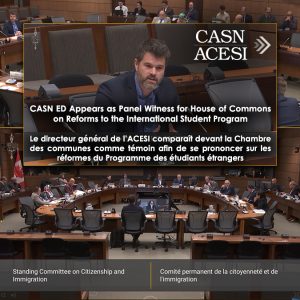 On December 2, 2024, CASN Executive Director (ED), Jean Daniel Jacob, was invited to The House of Commons (HOC)’ Standing Committee on Citizenship and Immigration (CIMM) as a representative of CASN to appear as part of a panel of witnesses in view of its study of the Recent Reforms to the International Student Program set out in the following HOC motion:
On December 2, 2024, CASN Executive Director (ED), Jean Daniel Jacob, was invited to The House of Commons (HOC)’ Standing Committee on Citizenship and Immigration (CIMM) as a representative of CASN to appear as part of a panel of witnesses in view of its study of the Recent Reforms to the International Student Program set out in the following HOC motion:
Motion of October 24, 2024 – That, pursuant to Standing Order 108(2), the committee undertake a study to examine the recent steps taken by the Minister of Immigration, Refugees and Citizenship regarding the international student program, specifically including the introduction of the cap, the update to the financial requirements, and the recent and upcoming regulatory amendments regarding the international student program; that this study include a focus on the critical role of provinces and territories and their jurisdiction in this regard; review the current and future impact of recent federal reforms; that this study explore further steps that may be needed to ensure the long-term sustainability and success of the international student program as well as the success of international students in Canada and Quebec; that the study consist of no less than four meetings; that the Minister of Immigration, Refugees, and Citizenship to appear for one hour with departmental officials along with the officials appear for one additional hour; that the committee report its findings to the House; and that pursuant to Standing Order 109 the government table a comprehensive response to the report.
A video recording from the meeting (No. 119 CIMM – Standing Committee on Citizenship and Immigration) can be accessed here: https://parlvu.parl.gc.ca/Harmony/en/PowerBrowser/PowerBrowserV2/20241202/-1/42849?gefdesc=&startposition=20241202153607
- Dr. Jacob’s witness report occurs between 15:37:49-15:44:27.
In his brief to the HOC CIMM chair, Sukh Dhaliwal, Dr. Jacob addresses significant challenges in Canadian nursing education, particularly concerning international students. International students play a role in meeting local health care needs, yet recent reforms threaten the sustainability of these programs. The COVID-19 pandemic worsened nursing shortages, prompting provincial funding to rapidly increase program capacity. Current reforms have created a context in which increased pressures on nursing programs are met with reduced resources for faculty and students. Nursing education in Canada faces faculty shortages, with many positions unfilled and retiring faculty members. Ultimately, the future of nursing education in Canada depends on sustained public funding and collaboration among education institutions, all levels of government, and communities to ensure programs remain adequately supported and capable of producing a diverse, well-prepared nursing workforce.
“Delivery of sustainable education programs and the creation of a sustainable workforce require careful considerations from institutions and provincial and federal governments. All students, including international students, should enter a nursing program that has the physical and human resources, including classroom space, lab equipment, and clinical placements, for a high-quality educational experience, successful program completion, and strong positioning to pass the registration exam. Graduate education in nursing is required for most faculty positions within a school of nursing and therefore has a direct impact on the sustainability of the nursing workforce,” said Dr. Jacobs.
The committee heard from other members of the panel of witnesses including André Côté from The Dais at Toronto Metropolitan University and Ajay Patel from Vancouver Community College.
CIMM members posed questions to the witnesses (starting at 15:58:25 in the video). During the question period, CIMM member Tom Kmic asked Dr. Jacob whether he supported the cap on International Student Program. Dr. Jacob responded that he conditionally in support of the cap, provided it meets the needs of both the schools of nursing and health care industry. CIMM member, Alexis Brunelle-Duceppe asked Dr. Jacob about Canada-wide measures and their negative impact on select regions, as well as concerns regarding “brain drain” linked to international student recruitment. Dr. Jacob emphasized the importance of ethical student recruitment, considering the needs of other countries while maintaining a balance between international ethics and domestic priorities. When asked by CIMM member, Jenny Kwan, for any recommendations for the government, Dr. Jacob responded by emphasising the systemic effects of the reforms on academic institutions, including Schools of nursing.
CASN submitted a complete brief to the HOC.


